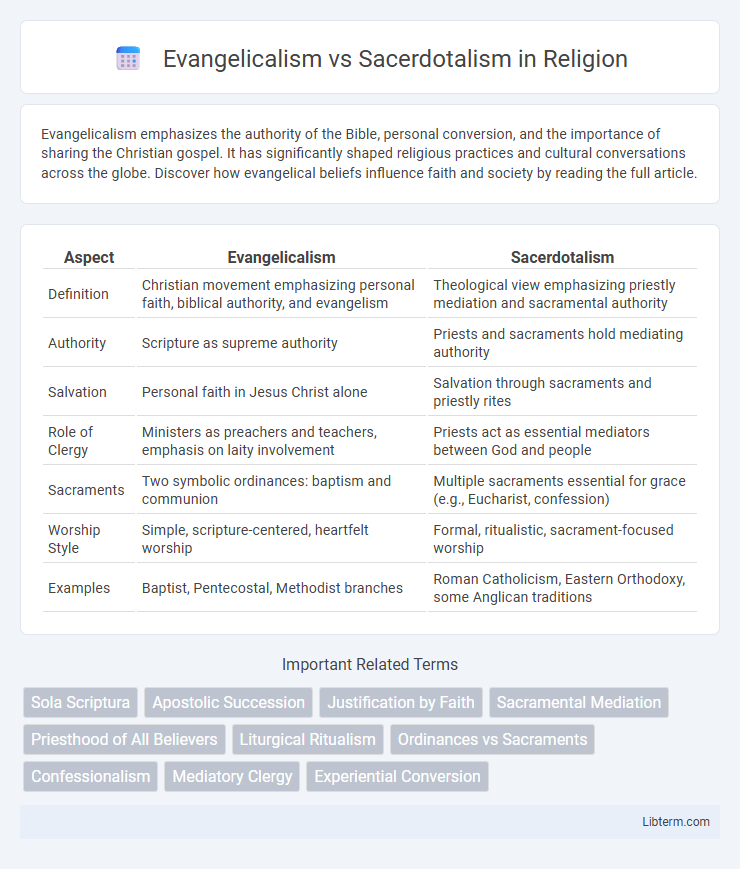Evangelicalism emphasizes the authority of the Bible, personal conversion, and the importance of sharing the Christian gospel. It has significantly shaped religious practices and cultural conversations across the globe. Discover how evangelical beliefs influence faith and society by reading the full article.
Table of Comparison
| Aspect | Evangelicalism | Sacerdotalism |
|---|---|---|
| Definition | Christian movement emphasizing personal faith, biblical authority, and evangelism | Theological view emphasizing priestly mediation and sacramental authority |
| Authority | Scripture as supreme authority | Priests and sacraments hold mediating authority |
| Salvation | Personal faith in Jesus Christ alone | Salvation through sacraments and priestly rites |
| Role of Clergy | Ministers as preachers and teachers, emphasis on laity involvement | Priests act as essential mediators between God and people |
| Sacraments | Two symbolic ordinances: baptism and communion | Multiple sacraments essential for grace (e.g., Eucharist, confession) |
| Worship Style | Simple, scripture-centered, heartfelt worship | Formal, ritualistic, sacrament-focused worship |
| Examples | Baptist, Pentecostal, Methodist branches | Roman Catholicism, Eastern Orthodoxy, some Anglican traditions |
Introduction to Evangelicalism and Sacerdotalism
Evangelicalism emphasizes personal faith, the authority of Scripture, and the necessity of a direct relationship with Jesus Christ, often rejecting hierarchical priestly mediation. Sacerdotalism centers on the belief that priests serve as essential mediators between God and humanity, administering sacraments as channels of divine grace. These contrasting theological frameworks shape distinct worship practices and ecclesiastical structures within Christianity.
Historical Origins and Development
Evangelicalism emerged in the 18th century during the Great Awakening, emphasizing personal faith, biblical authority, and the priesthood of all believers, contrasting with Sacerdotalism's focus on the ordained priesthood as mediators of grace rooted in early Christian and Catholic traditions. The development of Evangelicalism stressed revivalism and individual conversion, while Sacerdotalism maintained sacramental rituals and hierarchical church structure inherited from apostolic succession. Historical tensions between these movements highlight differing interpretations of salvation, authority, and ecclesiastical roles within Christianity.
Core Theological Differences
Evangelicalism emphasizes personal faith in Jesus Christ as the sole means of salvation, highlighting the authority of Scripture and the priesthood of all believers, rejecting the necessity of sacerdotal mediation. Sacerdotalism upholds the essential role of ordained clergy as mediators between God and humanity, often linking the administration of sacraments to the priest's authority for salvation and grace. These core theological differences shape contrasting views on salvation, ecclesiology, and the interpretation of sacraments within Christian traditions.
Authority: Scripture vs. Clergy
Evangelicalism emphasizes the supreme authority of Scripture, asserting that the Bible alone is the ultimate guide for faith and practice, known as sola scriptura. Sacerdotalism grants authoritative power primarily to the clergy, viewing ordained priests as essential mediators between God and believers through sacraments and church tradition. This fundamental difference shapes their respective doctrines, with Evangelicals advocating personal interpretation of the Bible and Sacerdotalists relying on ecclesiastical hierarchy for doctrinal guidance.
Salvation: Faith Alone vs. Sacramental Grace
Evangelicalism emphasizes salvation through faith alone (sola fide), asserting that personal belief in Jesus Christ grants justification and eternal life without reliance on church rites. Sacerdotalism, in contrast, teaches that sacramental grace conferred by ordained clergy is essential for salvation, often requiring participation in sacraments such as baptism, confession, and Eucharist. This fundamental divergence shapes divergent ecclesiological and soteriological frameworks within Christianity, influencing liturgical practices and doctrinal interpretations of grace and redemption.
Worship Practices and Rituals
Evangelicalism emphasizes personal faith and direct engagement with Scripture during worship, often featuring spontaneous prayer, contemporary music, and extemporaneous sermons to foster a relational experience with God. Sacerdotalism centers on the priest's role as mediator between God and congregants, highlighting formal liturgical rituals, sacraments such as the Eucharist, and structured ceremonies that convey divine grace. Worship practices in Evangelicalism prioritize individual spiritual renewal, whereas Sacerdotalism upholds the sacramental authority and ecclesiastical tradition within worship contexts.
Role of the Church Community
Evangelicalism emphasizes the priesthood of all believers, promoting active participation and personal relationship with God within the church community. Sacerdotalism underscores the mediating role of ordained clergy, viewing the church community as reliant on priests to administer sacraments and spiritual authority. The church community in Evangelicalism is seen as a fellowship of believers, while in Sacerdotalism it centers around the hierarchical structure and sacramental functions performed by the clergy.
Sacraments and Ordinances Explained
Sacerdotalism emphasizes sacraments as vital channels of divine grace administered by ordained clergy, particularly the Eucharist and Baptism, which are seen as means of salvation and spiritual transformation. Evangelicalism views sacraments more as symbolic ordinances, memorial acts of obedience rather than conduits of grace, focusing on the believer's personal faith and relationship with God over ritual efficacy. The theological divergence centers on the nature and function of sacred rites, with Sacerdotalism mandating ordained priesthood for sacramental administration, while Evangelicalism prioritizes scriptural authority and individual faith expression in its observance of ordinances.
Modern Expressions and Denominational Impact
Modern expressions of Evangelicalism emphasize personal faith, biblical authority, and active evangelism, influencing denominations such as Southern Baptists and Pentecostals. Sacerdotalism, which upholds the priest's mediatory role in sacraments, persists prominently in Roman Catholicism, Eastern Orthodoxy, and Anglicanism, shaping liturgical practices and ecclesiastical hierarchy. The denominational impact reveals Evangelicalism's focus on individual conversion and scripture, contrasting with Sacerdotalism's ritual-centered worship and clerical mediation.
Ongoing Debates and Contemporary Relevance
Evangelicalism emphasizes personal faith and direct relationship with God, challenging Sacerdotalism's reliance on priestly authority and sacramental mediation. Ongoing debates center on interpretations of scripture, the role of clergy, and the necessity of sacraments for salvation, reflecting divergent views on spiritual access and ecclesiastical power. Contemporary relevance emerges as these discussions influence church practices, ecumenical dialogue, and individual faith expression within global Christianity.
Evangelicalism Infographic

 libterm.com
libterm.com